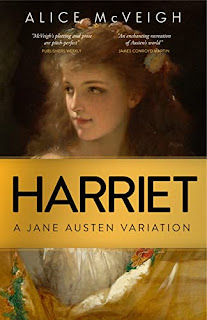https://www.amazon.com/dp/B09R4XMRX6
Harriet looks like an exciting story. Can you tell us a little about it?
It’s. a reimagining of Jane Austen’s Emma – with two twists. The second one I’m not spoiling, but the first twist is that I imagined the heiress Emma’s dumb little protegee, Harriet, as being smart enough to pretend to be dumb.
This is because Emma (as everyone who likes Jane Austen knows) is a know-it-all and enjoys feeling superior to other people.
So my Harriet is actually pretty clever. She’s using Emma and Emma’s grand friends, to try to lift herself in local society. The 1810s in Britain were really all about social circles and ‘my’ Harriet is determined to “marry high” – despite her lowly birth.
I’m really excited that Harriet’s done well so far – Publishers Weekly gave it a starred review, and it won the Gold Medal in the Global Book Awards 2022.
What inspired you when writing Harriet?
Emma is my favourite book. I’ve had it by heart for years. And I guess I loved it so much I wanted to tweak one of the characters and see if the puzzle pieces fell differently. The character of Harriet always slightly annoyed me – I’m not crazy about the dumb blonde, as a stereotype, and Austen’s Harriet seemed very much a dumb blonde.
The second reason is more personal. My book should have been called Jane and Harriet, because it’s narrated both by Harriet and by Jane Fairfax, the beautiful, elegant and intensely musical young woman whom Emma is expected to befriend, instead of Harriet. But Emma’s jealous of Jane Fairfax: Jane’s elegance oppresses her.
However, I was drawn to Jane, because I’m also a professional cellist. In other words, as a London musician, I found writing about Jane Fairfax irresistible.
So my book is partly Harriet’s tale and partly Jane’s. Jane Austen had already done Emma herself perfectly.
What part of the book did you have the most fun writing?
Jane Fairfax’s chapters. Jane Fairfax has inspired people ever since Emma was published – there were two other novels about her published so far this year (which mine is, partly, so that’s three)!
And the reason is the ‘missing scenes’. Austen didn’t have time and space to include the scenes in Weymouth, where Jane Fairfax becomes secretly engaged – or some of the later scenes, either. I enjoyed writing those scenes the most because I had a completely free hand, and could write what I liked and let my imagination go.
What part of the book did you have the hardest time writing?
None of it. It’s editing that gets me down!!!
What do you like to do when not writing?
As I mentioned, I’m a professional cellist, and lucky enough to have been offered an Elgar concerto with the Bromley Symphony Orchestra in November. So I practice the Elgar quite a lot.
I’m also crazy about tennis – I play three times a week - but I also follow the real tennis players. The tennis channel is one of my happy places, the Grand Slam tournaments, especially.
Where can readers find out more about your work?
My website is https://www.alicemcveigh.com
I have a new edition of my Hachette-published first novel, about the secret life of an orchestra, coming out in September.
The third of my Jane Austen series – all about Darcy – won’t be published until early 2023.

